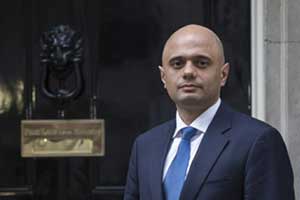The Museums Association Esmee Fairburn Collection Fund has awarded £120,000 to the National Justice Museum to introduce its unique 200-year-old HM Prison Service collection to a wider audience.
The funding supports a three-year project ‘Ingenuity, Creativity, Hope’ involving people in… more
Calum Macleod, Chair of the Police Federation of England and Wales, speaks at the PolFed annual conference:
When I first became a police officer more than 22 years ago in Strathclyde, I never imagined I’d be sat here, as chair of the organisation that represents the backbone of British policing the Home Secretary.
Yet here I am, on the eve of my first conference as chair, reflecting on a situation where we have welcomed another newcomer to the political stage, the new Home Secretary Sajid Javid.
So what are we expecting from the new incumbent who has been parachuted into one of the hottest seats in British politics?
In short, it goes like this: less talk and more action. I know he has only been in office a few days, and he has an enormous task on his hands – not least the Windrush immigration crisis - but policing and keeping our communities safe is too important to relegate to the bottom of the pile.
Like many of our 120,000-plus members, my background is in response and neighbourhood policing. I have spent the majority of my service in frontline operational duties. So I have massive sympathy for my colleagues out there, pounding the streets, day in, day out, and dealing with a rising explosion of violence, the likes of which we have not seen for decades. I have been in their shoes.
We’ve seen the latest knife crime figures soar by a staggering 22% and gun crimes by 11%. By the first week of May, the tally of victims killed by violent crime across the UK had reached a disturbing 62. In fact murder rates in London now dwarf New York’s.
But shocking though those figures are, they appear to have become an almost inevitable backdrop to the discussions playing out almost daily on our television screens and radio airwaves: politicians and pundits wringing their hands, saying ‘we must do better’. 
Yes, we must – and that needs to start with an honest dialogue, for a change. There’s no point in rolling out a new Serious Violence Strategy, without taking into account the 22,000 officers policing has lost since 2010. So effectively there are fewer people to do the job.
That’s fewer officers on the beat, patrolling their neighbourhoods and communities, trying to keep people safe. Intelligence from neighbourhood policing is one of the single biggest weapons in the fight against violent crime, including terrorism. People sometimes look back with fond nostalgia on policing in days gone by, in an era where the local policeman seemed to know the names of everybody on his patch. When problems arose, his innate local knowledge often led him straight to the perpetrators. Or the community, who trusted him, would rally round and come and tell him.
Of course we recognise that policing cannot stay still, and has had to modernise. But the sad fact is that since the erosion of neighbourhood policing, many communities no longer have that same bond of trust with their local police.
Over the past few years we have lost 3,500 neighbourhood officers, the eyes and ears of communities – there are now only around 19,200 in neighbourhood teams across all 43 forces in England and Wales.
No wonder crime, particularly violent crime, has gone through the roof. And our members are at the sharp end of it.
So Government needs to take off its ear plugs and listen properly to us. The public needs it, they deserve it, so they can have a police service they can be proud of, one that protects communities and our way of life. Not a way of life where a 13-year-old boy is cruelly cut down on his way back from a Bank Holiday wedding.
We need Government not to roll out another strategy – but to put their money where their mouth is. In December they announced a £450m increase in the proposed police budget allocation for 2018/19 across England and Wales. The Prime Minister was subsequently criticised by the UK Statistics Authority for this misleading statement. £450m may sound impressive, but much relies on sourcing funds from existing local budgets and increased council tax precepts. That means taxpayers paying even more money for their police service!
Now there is talk of expanding a private police force for hire nationally. For up to £200 a month, residents in some of London’s most expensive streets in Belgravia, Mayfair and Kensington, can sign up for patrols by uniformed employees of TM Eye. Clients even get a ‘meet-and-greet’ service from their car or the Tube, and have a hotline to their bobby whose location they can track on their iPad.
We live in a democratic society and the public are entitled to choose and pay for residential services of their own choice. Except policing is not a consumer or lifestyle issue. Nor should it be in the exclusive domain of the wealthy.
But you cannot escape the stark fact that the operatives working for this private company are not the police; they do not hold police powers; they are not warranted officers; they do not serve the Crown; in fact they are only accountable to the company’s owners, not the public.
This development only serves to highlight the problems we are facing, with increased demand, rising crime rates – and a dwindling, overstretched police workforce – which is even acknowledged by HM Inspectors to be ‘in crisis’.
So come on Mr Javid. As then Chancellor George Osborne famously said in his House of Commons speech in October 2015: “The police protect us and we are going to protect the police”.
Enough of the spin, Government needs to roll up its sleeves and get to grips with the problem, not just talk about it. It needs to make good its promise to protect its protectors.
The public not only deserve it; they rely on it.



